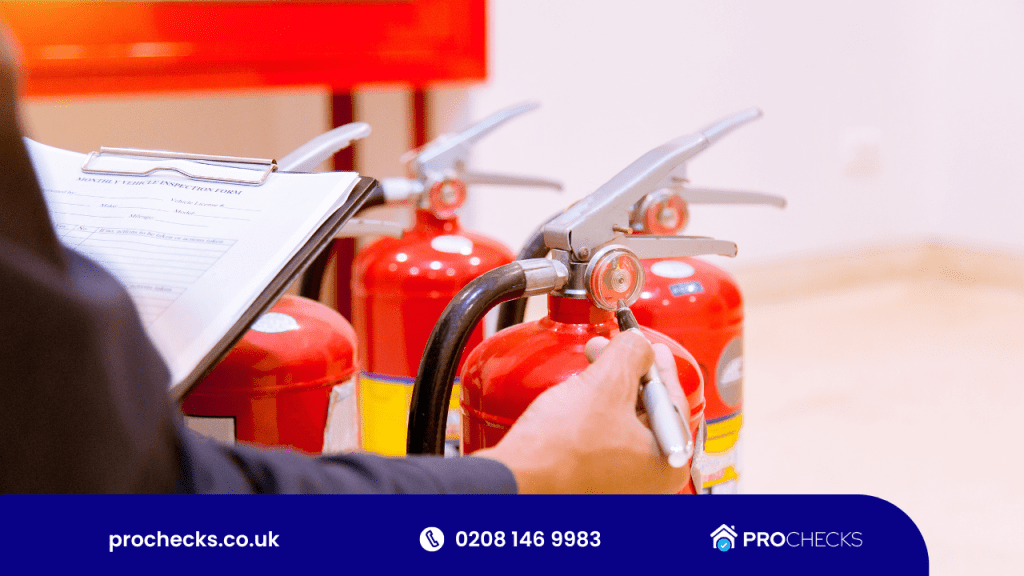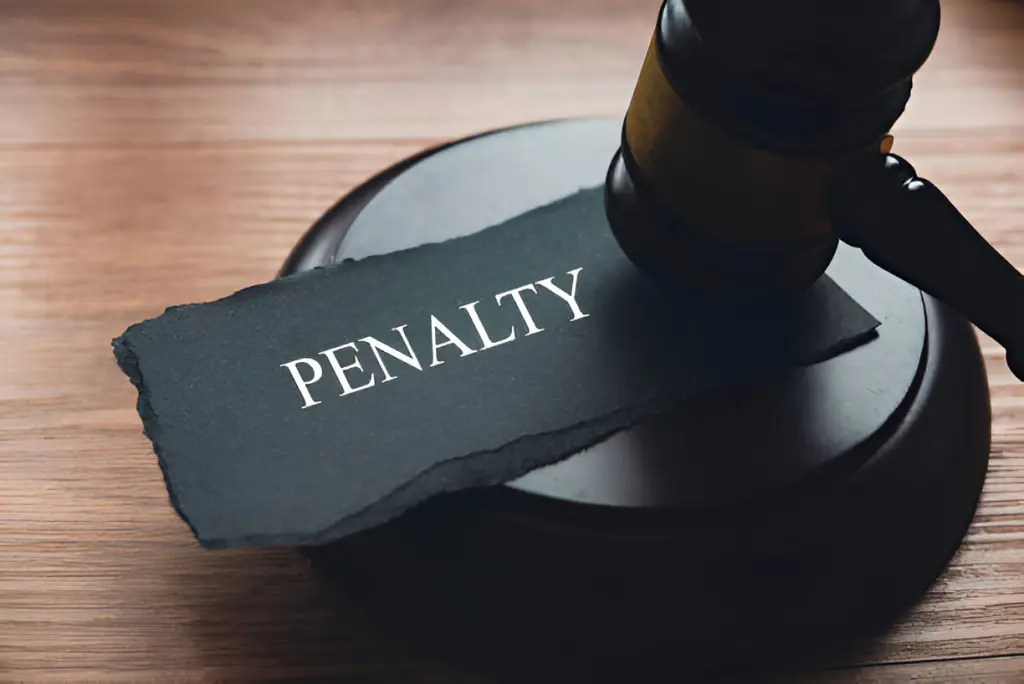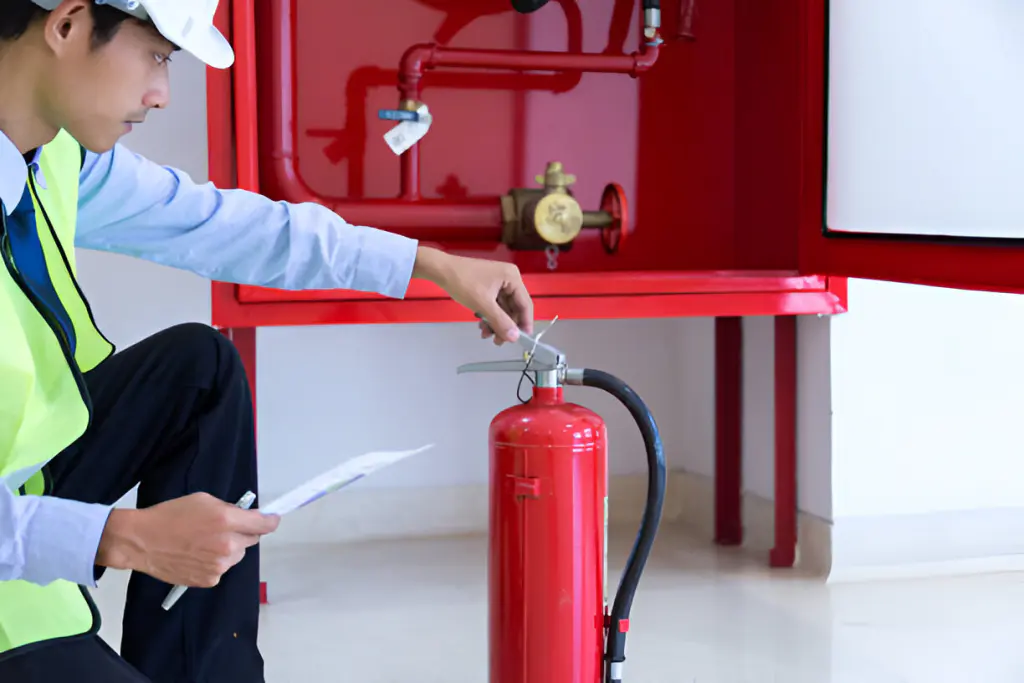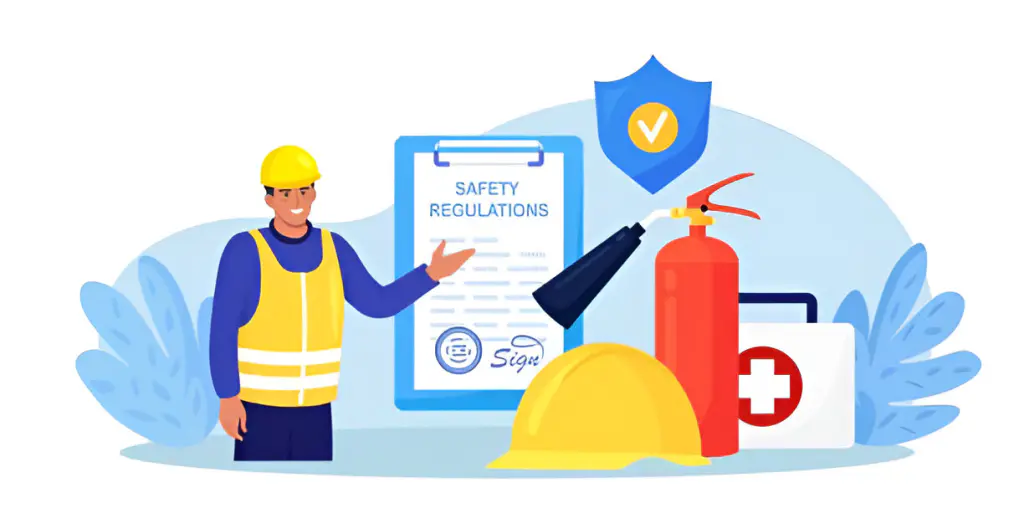Operating without a valid Fire Safety Certificate can expose property owners and managers to a complex web of legal and financial risks. Beyond the immediate threat of penalties, which may escalate depending on the jurisdiction, the implications extend to the realm of insurance coverage and liability in case of fire incidents. Neglecting this crucial compliance not only jeopardizes the safety of occupants but also places the operational status of the business under scrutiny by authorities. As we peel back the layers of accountability and explore the potential repercussions, one must consider whether the risks of non-compliance are too great a gamble. Let’s understand What Happens if I Don’t Have a Valid Fire Safety Certificate?
What is a Fire Safety Certificate?
A Fire Safety Certificate is an official document issued by a building control authority that certifies that the design of a building or structure complies with the legal requirements regarding fire safety measures as outlined in local building codes and regulations.
This certificate is crucial in highlighting the building’s adherence to essential safety protocols, designed to protect life and property in the event of a fire. This certificate is issued after a thorough evaluation of the building’s design drawings and specifications to ensure they meet stringent fire safety standards.

Understanding the importance of fire safety, the renewal of this certificate is also vital. Renewal processes ensure that buildings continue to meet safety standards over time, considering any structural changes or evolving regulations.
It serves as a regular check-up on the building’s ability to safeguard against fire hazards.
For property owners and developers, obtaining and renewing a Fire Safety Certificate is a legal obligation and a crucial component of responsible property management.
It assures occupants that fire risks are meticulously assessed and managed, thereby underscoring the commitment to maintaining a safe living and working environment.
Legal Requirements for Fire Safety Certificates in London
Navigating the complexities of fire safety regulations, London mandates specific legal requirements for obtaining Fire Safety Certificates.
These certificates are essential for building owners to demonstrate compliance with safety standards, ensuring that all occupants are protected against the risks of fire. Adherence to these requirements is not only a legal obligation but also a critical component of risk management in property administration.
Key aspects of the legal framework include:
- Assessment by Approved Inspectors: Buildings must be evaluated by certified professionals who assess fire safety measures against established standards.
- Detailed Documentation: Submission of comprehensive plans detailing the fire safety arrangements, emergency exits, and fire detection systems is required.
- Regular Updates: Any significant alteration to the building or its use must be reported, necessitating a reevaluation of the existing certificate.
- Compliance with Building Regulations: All fire safety measures must align with the latest Building Regulations about fire safety.
- Renewal and Maintenance: Certificates must be renewed periodically, and ongoing compliance must be documented and submitted to the relevant authorities.
These stipulations ensure that every building meets the rigorous demands of fire safety regulations, fulfilling compliance obligations and safeguarding lives and property.
Consequences of Operating Without a Valid Certificate
Operating without a valid Fire Safety Certificate exposes building owners to severe legal consequences, potentially including substantial fines and, in extreme cases, imprisonment. This is not merely a procedural oversight; it signifies a fundamental lapse in adhering to legislated safety standards, which are crucial for protecting occupants and property from fire hazards.
The absence of a valid certificate undermines the integrity of fire safety measures within the building. It suggests that essential systems and protocols, such as fire alarms, sprinklers, and emergency evacuation procedures, may not be up to current standards or are possibly malfunctioning. This oversight can lead to catastrophic outcomes during fire incidents, where the effectiveness of these systems is critical.
Moreover, without regular audits and renewals required for maintaining a valid certificate, there is a high probability that fire safety training for staff has been neglected. This neglect can result in improper handling of fire emergencies, thereby escalating the risk to life and property. Emergency evacuation plans may also not be regularly updated or practiced, increasing confusion and panic during an actual crisis, which can lead to injury or worse.
In essence, the lack of a valid Fire Safety Certificate is a glaring red flag, signaling potential peril not just legally but in terms of human safety and security.
Potential Fines and Penalties
In the realm of fire safety compliance, stringent penalties are imposed on building owners who fail to maintain a valid Fire Safety Certificate.

Regulatory enforcement of these standards is rigorous, reflecting the critical nature of adhering to fire safety protocols to protect property and lives. The consequences for non-compliance can be severe, affecting not only the safety but also the financial standing of the responsible parties.
Key penalties include:
- Monetary Fines: These can vary widely based on jurisdiction, the severity of the infraction, and whether the issue has led to any incidents.
- Legal Actions: Non-compliance can result in legal proceedings, including criminal charges if negligence is proven, especially in cases leading to fire incidents.
- Compulsory Shutdowns: Buildings may be temporarily closed until they meet fire safety standards, disrupting business operations and causing financial losses.
- Reputation Damage: The public exposure of failing to comply can harm an organization’s reputation, potentially leading to a decrease in business opportunities.
- Periodic Inspections: Increased scrutiny from fire safety authorities, leading to more frequent and rigorous inspections.
Impact on Property Insurance in London
Maintaining a valid Fire Safety Certificate significantly influences property insurance policies in London. Insurers assess risks meticulously, and the absence of certification can lead to heightened premiums or even denial of coverage. For property owners, this means securing a valid certificate is not just a regulatory mandate but a crucial factor in safeguarding their investment.
Insurance companies leverage the status of fire safety compliance to gauge the potential risk associated with insuring a property. A valid certificate serves as a testament to a property’s adherence to safety norms, thereby reducing perceived risks and possibly lowering insurance costs. Conversely, properties lacking such credentials pose a higher risk, prompting insurers to adjust their coverage terms unfavorably. This adjustment not only affects the cost of premiums but can also impact the overall insurability of the property.
Furthermore, the property value itself is intertwined with its insurability. Prospective buyers and investors are likely to scrutinize the availability of comprehensive insurance coverage before committing to a purchase. A lack of proper fire safety certification can diminish a property’s market value, deterring potential investment and complicating financial transactions related to real estate.
Thus, maintaining up-to-date fire safety documentation is indispensable for property owners looking to preserve both the value and insurability of their assets in London’s competitive market.
Risks to Tenants and Visitors
While property owners face increased insurance costs and challenges in market value without a valid Fire Safety Certificate, the repercussions extend significantly to tenants and visitors as well.
The absence of this certificate poses serious risks that compromise tenant safety and visitor protection, directly impacting their well-being and security within the premises. It is essential to understand the potential hazards that arise from non-compliance with fire safety regulations.
- Increased Risk of Injury or Death: Inadequate fire safety measures can lead to severe accidents, injuries, or fatalities during a fire outbreak.
- Legal Liability: Property owners might face lawsuits for negligence, which could also implicate them in criminal charges if found guilty of violating fire safety laws.
- Psychological Impact: Continuous exposure to unsafe living or visiting environments can cause stress and anxiety among tenants and visitors.
- Emergency Response Delays: Lack of proper fire safety signage and equipment can delay emergency response times, exacerbating situations and potentially leading to greater harm.
- Damage to Belongings: Without adequate fire control systems, tenants and visitors may experience significant loss or damage to personal property during a fire incident.
These factors underscore the critical importance of maintaining up-to-date fire safety measures to safeguard everyone within a property.
Steps to Obtain a Valid Fire Safety Certificate
Securing a valid Fire Safety Certificate is a critical step for property owners to ensure compliance with local fire safety regulations and to minimize risks associated with fire hazards.

The process begins with a thorough understanding of the specific requirements set forth by local fire safety authorities. Property owners must first engage with a certified fire safety inspector who will conduct a detailed inspection of the premises. This inspection process evaluates all aspects of the building’s fire safety measures, including but not limited to, fire alarms, emergency exits, fire extinguishers, and sprinkler systems.
Following the initial inspection, property owners receive a report detailing any deficiencies that must be addressed to comply with fire safety standards. Property owners must rectify these issues promptly.
Once improvements are completed, a follow-up inspection is arranged to ensure all corrections meet the regulatory standards.
The certification timeline can vary depending on the size and complexity of the property, as well as the responsiveness of the property owner to address identified deficiencies.
Once compliance is verified, the fire safety authority issues the Fire Safety Certificate, affirming the property’s adherence to safety norms and readiness in case of a fire emergency.
Common Misconceptions About Fire Safety Compliance
Why do so many misconceptions persist about fire safety compliance?
Despite stringent regulations and ongoing public education, several myths continue to undermine the importance of thorough compliance.
These fallacies not only skew perceptions but also potentially endanger lives by encouraging inadequate safety practices.
Understanding and dispelling these myths is crucial for maintaining secure environments in residential and commercial buildings.
- Only large buildings need to comply: Many believe that fire safety laws apply strictly to large commercial properties.
In reality, small businesses and residential properties must also adhere to specific fire safety standards.
- A single extinguisher is sufficient: Some assume that having one fire extinguisher on hand meets compliance requirements.
However, the type, size, and number of extinguishers required can vary significantly depending on the building’s layout and use.
- Annual inspections are excessive: This compliance misconception underestimates the necessity of regular safety checks, which identify potential risks and mitigate hazards before they escalate.
- Compliance is too costly: While there are costs involved, the potential financial and human cost of non-compliance due to fires can be far greater.
- New buildings automatically comply: New constructions must still be inspected and certified to ensure all fire safety measures are correctly implemented and functional.
Resources for Fire Safety Regulations in London
Understanding the specifics of fire safety regulations is vital for maintaining compliance and ensuring the safety of both residential and commercial properties in London.
The complexity of these regulations necessitates access to accurate and comprehensive resources that provide both the legal framework and practical guidance for adherence.

For property owners and managers in London, the London Fire Brigade (LFB) provides extensive resources on its official website.
These include detailed guidance on conducting fire safety audits, which are critical for assessing the current fire safety measures in place and identifying areas requiring improvement.
The LFB also offers templates for compliance checklists, which serve as essential tools for regular inspections and ensure that all fire safety standards are consistently met.
Moreover, professional associations such as the Institute of Fire Safety Managers (IFSM) and the Fire Protection Association (FPA) offer seminars, training programs, and updated information on fire safety regulations applicable in London.
Membership in these organizations provides access to expert advice and the latest industry standards.
Conclusion
In conclusion, the absence of a valid Fire Safety Certificate exposes property owners in London to a multitude of risks and legal repercussions. Significant penalties denied insurance claims and compromised safety of occupants underscore the critical nature of compliance. Property owners must adhere to regulatory demands by obtaining the necessary certification, thereby ensuring legal conformity, tenant safety, and the integrity of their financial and reputational standing.









